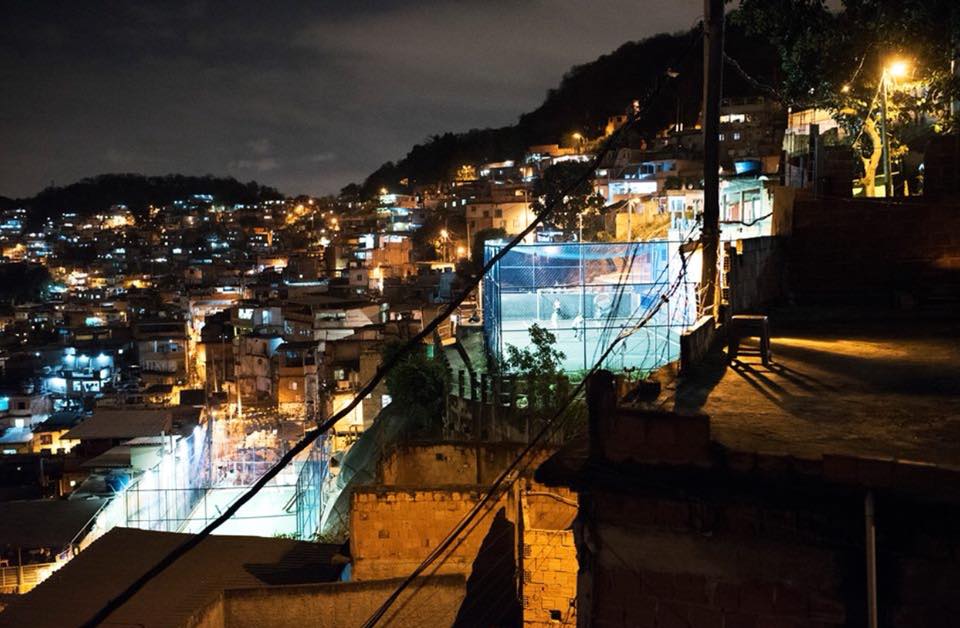Last month, I reviewed Zebras, a low-budget documentary which followed the Argentine boys team that competed in the 2014 Street Kids World Cup in Brazil. StreetKids United 2: The Girls of Rio is a slicker production by Director Maria Clara, following a team of girls from Rio who compete in the same tournament.
The Favela Street Girls team was started in 2011 by Coach Philip Veldhuis under the NGO Ibis. Then 31 years old, he is Dutch and an Ajax fan. He is assisted by Roxanne “Rocky” Hehakaija, a former pro who helped with training because of their past friendship in the Netherlands.
While the girls ably represent Brazil on the field, the challenges they face in their real lives are similar to those of the Argentine boys. Cast out of their homes by parents or family, street children deal with issues of low self-esteem and low expectations. Local girl Jessica Maria serves as an assistant coach; she was kicked out of her house at 14 because she was using and running drugs for the favela gang.
Favelas are either “Pacified”, i.e., not run by drug gangs, or “Non-pacified”. If non-pacified, then for young girls, their life aspiration is to become Minas, wives of the “soldiers” in the gangs. The highest goal is to become First Lady, girlfriend of the highest guy in the drug gang. The Favela Street Girls instead teach the players to believe that they are Somebody, and that they can aspire to be more than a gang moll.
The film shows how tough it can be to teach such lessons when a non-pacified favela suffers drug wars, police violence, and protests against Brazilian corruption. However, playing under Philip, the girls learn to respect others, be supportive, make friends, talk about problems, and to exercise self-control.
Despite their daily problems, Brazilians have a lot of joy and try to make the best of their lives. The tournament gives the street children a glimpse of opportunity. They mingle with other countries and experience life away from their troubles. In a pre-tournament friendly versus the Rio British School, the Favela Street Girls get to meet Zico. The movie concludes with what happened to the girls.
Lots of recreational soccer in the film
There is quite a bit of footage of the girls’ games. As in Zebras, the lengthy inclusion of play tends to bog down the story. The Brazilian girls beat Indonesia 14-0. Zimbabwe gives them some trouble in the first half, but Brazil wins 4-0. Nicaragua is pretty husky, but Brazil prevails 3-1, taking them into the semis. In the semis they beat El Salvador 5-0. The final is played on a small field marked out in the Fluminese stadium. The Brazilians take the championship against the Philippines, but the final score is not shown.
World Cups for Street Kids and Homeless adults
On the Street Child United website, you can read about the other occurrences of the tournament, such as 2010 and 2018. After the Favela Street Girls’ success, in 2015 Chevrolet helped fund a small pitch in the Caracol community of the Complexo da Penha favela.

In 2018 Favela Street sent a team to Russia where Brazil repeated as champions. But shortly thereafter, around Aug-2018, their pitch was severely damaged. I thought I had seen a video that the damage was due to flooding, however according to a facebook post, the pitch may have been damaged by army vs gang fighting. It took over a year for the pitch to be rebuilt.
This link is a great writeup of the Favela Street Foundation and the work that Rocky Hehakaija continues to direct. I initially thought that Street Child United (registered in 2011) was part of the Homeless World Cup (founded in 2002), but they are separate UK charities, in fact HWC is a Scottish charity.
The purpose of Homeless World Cup films
A number of films have been made about participants in homeless World Cups, both adult and child teams. After reviewing and researching these films, I’ve concluded that true social change doesn’t come from a few hundred street people and volunteers engaging for 1-2 weeks. Only a small fraction of participants are able to change their lives after the games.
It seems that the real purpose of the homeless world cups is to raise awareness of the homeless situation. It is important to see and hear street people’s stories. Because as filmmakers say, you can’t understand what you can’t see. And if that motivates you to give a dollar or give a dime, then that’s a start.
6 Soccer Movie Mom Rating = 6
Resources:
- Released: 2015-10-17 (Netherlands)
- In English and Portuguese with English sub-titles
- IMDB
- Director: Maria Clara Costa
- Stars: Philip Veldhuis , Rocky Hehakaija
- Watch the Trailer
- Favela Street Website

